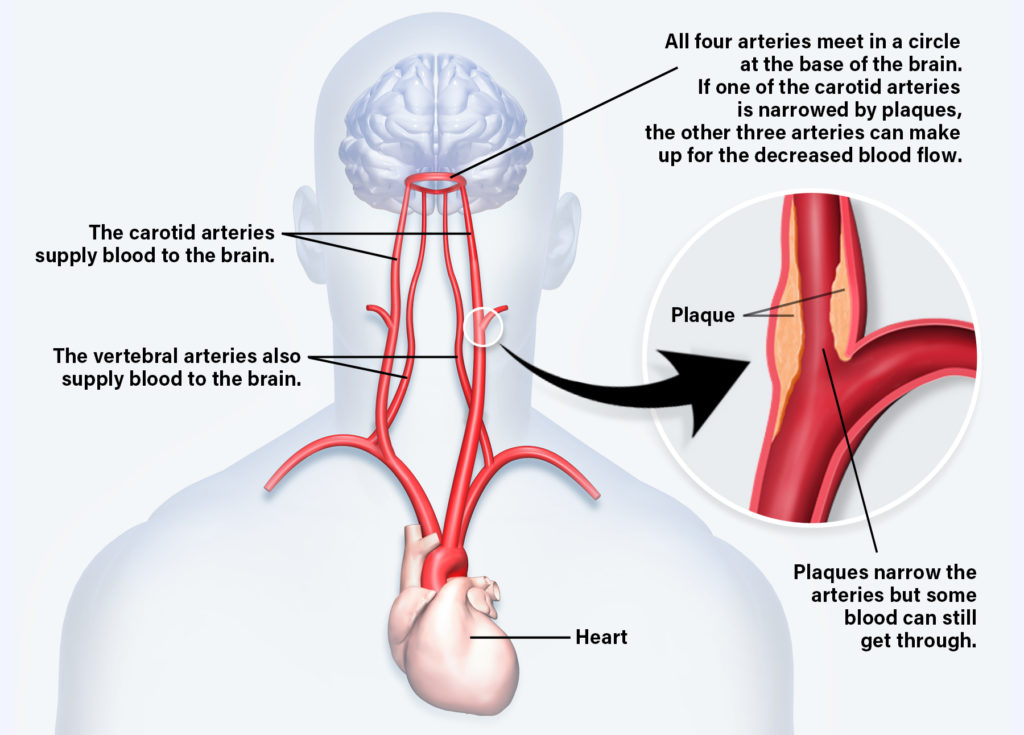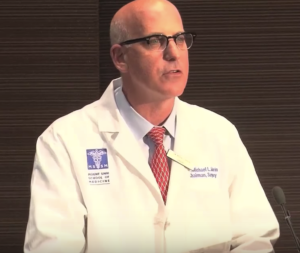
I was surprisingly calm while I waited for Dr. Marin’s nurse to call my name. Michael L. Marin is the Chairman, Department of Surgery at the Icahn School of Medicine at Mount Sinai and Surgeon-In-Chief at the Mount Sinai Health System in New York. His specialty is vascular surgery, which means (simplistically) he diagnoses, treats and manages conditions in the arteries and veins, also called blood vessels. A recent scan had revealed that moderate plaque buildup has narrowed my right carotid artery. Clinically, it’s called extracranial vascular disease. In my terms, it could be the prelude to a stroke. Dr. Marin would assess my situation a lot better than Google.
I needed to get answers to two questions: 1) What’s the likelihood I will have a stroke? 2) Would I need surgery to remove the plaque (Google told me it’s risky surgery)?
After introducing himself, Dr. Marin immediately, and warmly, announced: “I’ve carefully reviewed your scans and medical history,” and took out a pad and pen so he could show me what’s happening in my carotid artery. I also wanted to know what the artery does in the first place! I was a horrible science student but I continually force my brain to understand everything happening in my aging body! That way I can ask the right questions to get the answers I need to help me make informed decisions about my health.

“I’m not a good artist, so bear with me,” Dr. Marin said as he started to draw a picture and deliver a little medical tutorial. In minutes he taught me that my right carotid artery is one of four arteries located on the sides of the neck (there’s a second carotid artery and two vertebral arteries). The gang of four meet in a circle at the base of the brain, then branch off into many smaller vessels that supply oxygenated blood to the brain. Without this blood, brain cells die pretty quickly. Without a functioning brain, we die.
The good news is that the arrangement of smaller vessels feeding the brain pretty much guarantees that blood will still flow into it, even if three of the four major arteries are completely obstructed. The not-so-good news is that the plaque (formed by fat deposits) in my right carotid artery hasn’t closed it off entirely. Blood can still flow through it, but at greater pressure since the normal opening has narrowed. If the increased pressure caused a piece of plaque to detach from the wall of the artery, it could make its way into my brain, rupture, and trigger a blood clot to form. If the clot blocked one of the small blood-supplying vessels to the brain, part of my brain wouldn’t get blood and oxygen, causing brain cells to die after just a few minutes. Voila, a stroke!
More good news: Based on the “moderate” amount of plaque in my right carotid artery, it’s highly unlikely the scenario he just described will play out in my brain, Dr. Marin told me. I’m also asymptomatic, another positive sign. And, I don’t need surgery, at least not now. When Dr. Marin recommended that I have scans of my carotid arteries every six months, I asked if more plaque can accumulate. “ It can,” he answered.

“Is it possible the plaque formed in my artery because my cholesterol shot up when I stopped taking estrogen, I was eating all wrong and gaining weight, plus I was hardly exercising?” I asked.
“Absolutely,” he said.
“I recently lost 17 pounds and want to lose 17 more. I’ve started exercising again and I’m taking statins so my cholesterol numbers are excellent. I also take a low-dose aspirin,” I went on, perhaps to show Dr. Marin that I’m a ‘good girl.’
“That’s all important, but the one factor over which you have no control is genetics,” he explained.
“Got it. So what happens if the amount of plaque reaches a dangerous level and you think I need surgery to clean it out and avoid a stroke? I read that the surgery actually can cause a stroke,” I added.
“Yes, there’s a risk of that happening because a piece of plaque could break off during surgery. That’s why you should choose a surgeon who has done the procedure more than a few times,” Dr. Marin advised.
“When I do it, the risk is less than 1 percent,” he said, smiling.
That was more good news. As I wrote on the review of my visit, “I would put my carotid arteries in Dr. Marin’s hands without a moment’s hesitation.”
The moral of the story: Take charge of your own health, understand the issues confronting you, and do the necessary research to find the experienced doctors who can successfully treat your condition. You don’t have to love them. You’re not marrying them. (Although Dr. Marin would be a good candidate if he wasn’t already married.)


0 Responses to “This Kind Of Stroke Has Nothing To Do With Good Luck”
Vicki Violet says:
Thank you beautiful hearted Geri for encouraging us to take care of ourself, and also sharing something very personal. I will ask my own Dr about that scan. Take care xo
Dana Wells says:
Geri thanks for sharing your personal story. I read your story from lifeline screenings site. Just found out I also share your same 2011 diagnosis at age 57. From your recent screening, can you share if you got any plaque regression from the use of statins. Wish you all the best
Geri Brin says:
Hi Dana, thank you for your wishes. The plaque didn’t regress but it stayed the same. My regular doctor assured me that they don’t worry until the plaque is over 90%, especially if there are no symptoms. If your plaque is minor now, just make sure your cholesterol is in control, you exercise and you keep your BMI (body mass index) below 25. That way it won’t progress beyond the mild stage. I really had let myself go since my original diagnosis. Most every woman close to 60 has some plaque in the carotid artery. Fondly, Geri
Geri Brin says:
thank you, Vicki. Your comment is very kind!